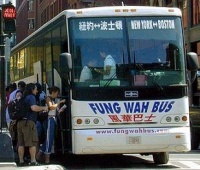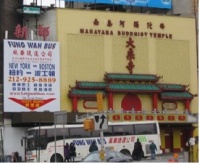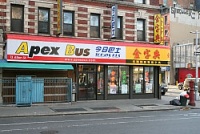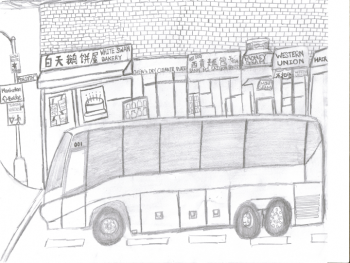Bus Transportation Networks
From East Broadway, Chinatown
The bus transportation networks along East Broadway are generally known as the Chinatown Bus lines which have emerged during the late 1990s. Each bus companies use large buses carrying 50-60 passengers. Some even screen movies and others have Wi-Fi. Contrary to what most people believed, these Chinatown buses are licensed by the Federal Highway Administration.
Contents |
History
The first company to start running buses between New York and Boston is Fung Wah Bus Transportation in 1998. These bus services were provided initially to help the Asian immigrants travel from one city to another since many of the migrants held restaurant jobs in other cities. Also many Chinese families had children attending schools in Boston.However, with the low fares the Chinatown buses provide compared to Greyhound and Peter Pan, it has become popular among the non-Asians too. Some of the bus lines transport their passengers to casinos, including Foxwoods and Mohegan Sun.
Today, the bus companies have expanded their services to Philadelphia,P.A, Washington D.C., Richmond, VA, Norfolk,VA, Atlanta, GA, Baltimore, MD, Rockville, MD, Nashville, TN, and Woodbury Outlets in NY.
Location
Many of the bus companies are dispersed along East Broadway.
Fung Wah Bus Transportation
Fung Wah was the first bus line owned by Pei Lin Liang. Mr. Liang gained experience from working part-time at Four Seas, a Chinatown shuttle service. From this skill he obtained, he began his own transportation business with a van service, taking passengers from Sunset Park to Chinatown for $1.50.In 1998, he decided to shift his business into transporting passengers from Chinatown, New York to Chinatown, Boston due to the increasing competition for customers within Sunset Park. Additionally, he noticed that many Chinese families had children attending schools in Boston. In fact, Chinese students as well as parents approached him for services to Boston. At first, his vans only ran once a day leaving New York at 9 A.M. and leaving Boston at 2 P.M. It costs $25 each way or $45 for a round trip, higher than the rate it is today: $15 one way or $30 round trip, although it is still inexpensive compared to the Greyhound and Peter Pan rates. By 1999, he had shifted his transportation system from vans to buses and operated seven departures a day. At this time, much competition have emerged to follow in Mr. Liang's footsteps.
Lucky Star
Lucky Star, formerly known as Travel Pack, was established in 2003 and was the first competitor to offer one-way tickets for only $15 at certain times of the day. This initiated the price wars and violence associated with these Chinatown buses. Fung Wah and Lucky Star lowered their price to an all-time low of $10.
Dragon Coach, Dragon Coach, U.S.A, and Apex Bus
Dragon Coach is owned by Edward Ho. His profession started as a tour bus company, but around 2001, he turned his company into a regular bus line: Dragon Coach, one of the first buses to operate at Washington D.C. He later introduced the Philadelphia line, which competed with New Century Travel.In 2003, Dragon Coach, U.S.A. emerged with $100,000 stolen by Edward's son, Jack Ho, and his partner Chen Di Jian. It was later shut down due to trademark infringement and Jack Ho began Today's Travel. Around this time, Chen Di Jian tried to partner with Jimmy Cheng, owner of Lotus Tours. He expanded his company to also run Today's Bus, now known as Apex Bus.
Apex buses are located on 88 East Broadway. The Apex bus company is located on 13 Allen Street. A ticket going from NY to Philadelphia costs $12 one way or $20 round trip, from NY to Boston costs $15 one way, and from NY to DC costs $20 one way.
Double Happiness
Double Happiness runs six buses to Maryland daily and two buses to Virginia. It also went to Wilmington, DE and Albany, NY. Double Happiness bus departs from two places, East Broadway and Herald Square.Eastern Travel
Eastern Travel is different from other Chinese bus companies. David Wong, owner of Easter Travel & Tour, moved the base of the bus from Chinatown to Penn Station. The bus line’s clean, mannerly, and orderly appearance made the bus company trustworthy. Eastern Travel buses run to major Chinatown cities such as Boston, DC, and Richmond.
Universe Bus line
A small Chinatown bus company located at 156 East Broadway (corner of Pike St/Allen St) The sign outside states it goes from Philadelphia, Washington DC, Richmond Norfork, and Chicago, but they actually only run services from New York and Philadelphia.
Rivalry
Price wars as it was known is when each bus companies lower their prices to attract more customers to their buses. The all-time low was at $10 one way to Boston. Prices did not only affect the Chinatown bus lines but the Greyhound and Peter Pan buses as well. These more luxurious buses had to lower their prices to accommodate their customers. They even sought an injunction against Fung Wah and Lucky Star. The request was denied. Prices were not the only element causing rivalry. Parking spaces also caused much violence.
After Septermber 11, 2001, there were few tourists. With less customers and increasing competition, companies tried to save a parking spot for their bus by sitting in the space.
Interview #1 with Ticket Seller
1)What bus company do you work for? Why did you decide to help this particular company sell their tickets?
-I work for the bus company call Sky Horse Bus Tour Inc. It’s one of the bus companies that travel the farthest distance, the final destination is in Michigan. My main job is selling phone cards because I have a booth at the Triple 888 Mall. Selling bus tickets is only an additional side job that doesn’t interfere with my real job.
2) How long have you worked there?
-I have this booth space on the outside of the Mall for over 10 years now, but I’ve only started selling tickets about 3 years.
3) How did you get this job? Did you offer to help them sell tickets or did they ask you?
- It started off as a favor to bus companies. Since my location is strategically located near Forsyth St where a lot of buses are, many bus companies gave me their business cards so when customers ask where to take a bus to certain location, I can help direct them. Then, I started getting offers to help them sell tickets and getting a small profit. I decided to pick this company because it’s a unique company; it’s the only bus that goes to Michigan. The cost is also more expensive than other buses, so I make a little more profit selling each ticket.
4) Are there benefits to helping these companies sell tickets?
- Of course there is. Each ticket to Michigan costs about $95 dollars one way, and $180 for round trip. For me, I make about $5 selling each one way ticket, which is not bad because it’s an additional salary.
5) How many hours a day/week do you work?
- I work on the days that I do have my booth open at the Mall. It’s 7 days a week and from morning to afternoon. I usually open my booth at 8 am and close at 8 pm too.
6) Who is your company's biggest competitors?
- Like I said before, since this bus company is the only one that goes to Michigan as far as I know, there is less competition.
7) As a ticket seller, do you help them market their bus? Or is selling tickets your only responsibility?
- I help as much as I can in terms of letting the customers know about the services of the bus company. Since my main job is selling phone cards, I’m not that actively involve with selling tickets. I only talk when customers approach me and ask me about the bus services.
8) Why do you think companies might not want us to interview them?
- I think it’s mostly because they are practical. They don’t feel it’s necessary to bother to answer your questions. They don’t trust people because they fear being exposed or tricked.
9) Recently, has competition been fierce? Such as, what would the average ticket of all the bus companies to Boston be compared to the past?
- For a lot of the bus companies, the competition has been very fierce. I know because my booth is near where a lot of buses are. Some companies drive down prices to keep out new bus companies from lasting, but then the prices would have to be adjusted later on otherwise companies would lose money. Luckily, the company I work for has less competition, being the only bus company to go as far as Michigan. Recently price of tickets has gone up because of costly oil has become.
10) Have you thought of opening a bus company yourself?
-No. I don’t have the necessary skills and capability to open a bus company. I don’t know how to drive and I can’t speak any English. Those are the basic skills you need in order to operate a functional company. I’m content with my business and besides, there’s a lot of more pressure when you own anything.
11) What was the impact of 9/11 on the bus companies?
-Not very much of a difference. There may be less visitor right after 9/11, but most passengers are not tourists but those who has a home in Chinatown and perhaps a business in another state.
12) Do passengers often complain about the service of the bus?
-Not that much. Most people are happy with the low price of tickets compared to American bus companies. The buses usually leave on time. The only complaint I’ve heard is the condition of the bathrooms in some of the buses. People sitting in the back complained that the smell reeks from the bathroom, that’s why it’s wise to use the bathroom before boarding the bus and whenever the bus stops at certain locations.
13) Does the government often check on the bus companies? How?
- I don’t see any inspection because I’m not directly involved in the running of these buses. However, there is a lot of traffic police who oversees that the buses follow traffic regulations to avoid accidents because the area is pretty densely populated.
14) How often do you see the managers or the bosses?
- Once a week when I first started. Now, I go in once or twice a month since I’ve been doing this for a while now and I have the trust of the company.
15) How do the companies manage to make a living with ticket costs at almost half the price of greyhounds & gas prices increasing?
- Making less of a profit. Over the years, the bus company I work for has been pretty steady in terms of ticket price. Recently the price has risen due to increasing gas prices. Compared to other bus companies, we have been fortunate. I would say other bus companies do make a profit, but they have to tighten time and spending. Accidents that you hear on the news happen because of drivers speeding to get to destinations on time.
16) What types of people usually buy tickets from you? Students, people working, Asians, whites, etc.'
-All kinds of people. It depends on the time of the year and season. In Aug. and Sept., I see a lot of students who attend college in Michigan buy their tickets from me. The regular customers would be the Chinese workers and Chinese restaurant owners who come to Chinatown once in a while for personal reasons. A lot of Whites, African Americans, and basically people of all races finds out about this bus and comes to Chinatown to buy tickets.
17) When does busy season start? Is there a busy time of the year like the summer (vacation) or are ticket selling constant throughout the year?'
- The busy season is around New Year’s and any major holidays. Chinese people come back to celebrate New Year’s in Chinatown. It’s the only time of year that many of them has a longer break, usually a week for most restaurants. Business during the summer is pretty good too.
18) What about the time of the day? What time do most people buy their tickets for?
- Night time.
Interview #2 with Garland
Garland came to New York from Norfolk, Virginia to sell clothes. He has only ridden in Double Happiness twice. When asked what quality is most important in a bus service, he replied that many factors come into play when deciding which bus company to choose such as the departure time, the price, and whether the people are courteous. He heard about this bus company from a friend and has tried different bus companies in the past. He couldn’t remember their names, but remembers that they are inter-connected with Double Happiness. He purchased the ticket back to Norfolk at a round trip price of $60, saving a total of $10 because he didn’t buy two single trip tickets instead. Although not too familiar with Double Happiness, he remembers that a few years ago, the price of Double Happiness was only $40 round trip compared to the $60 now.
Interview #3 with "Anonymous"
Anonymous stood alone on the line with her belongings waiting to be boarded on an Apex bus. She has been driven by friends from Richrmond, Virginia, to New York previously; however, she chose to take the Apex bus for the first time due to a friend’s referral. She also chose it over American bus because Greyhound would have cost over $200 and another bus company would have been around $180. The Chinatown bus only costs her $60 round trip, saving her over $100. In addition, Chinatown buses were more time efficient, taking about five hours. The conditions during the trip were relatively similar to the American bus rides; she described them as equally “smooth rides”. When asked which quality of a bus service is most important in deciding which bus to take, she replied that all the qualities mentioned (price, service, reputation, or safety) were important.
After the interview, we tried scouting for more interviewees and noticed she was getting impatient. Passengers were boarding the Apex bus while she was not instructed to board, and stood clueless near the Apex bus; however, after a while, an employee from New Century bus line ushered her onto the New Century bus instead. To our surprise, the employees for Apex bus did not complain or fight for the customer; the representatives of both bus companies talked in a low voice and soon after our interviewee boarded the New Century bus. Perhaps the bus lines were interconnected.



